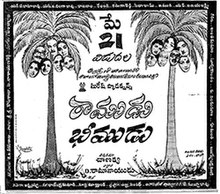Loading AI tools
1964 Indian film From Wikipedia, the free encyclopedia
Ramudu Bheemudu is a 1964 Indian Telugu-language film directed by Tapi Chanakya. It was produced by D. Ramanaidu under the Suresh Productions banner. It stars N. T. Rama Rao, Jamuna and L. Vijayalakshmi, with music composed by Pendyala. The film was a major box office success.[1]
| Ramudu Bheemudu | |
|---|---|
 Theatrical release poster | |
| Directed by | Tapi Chanakya |
| Story by | D. V. Narasa Raju |
| Produced by | D. Ramanaidu |
| Starring | N. T. Rama Rao Jamuna L. Vijayalakshmi |
| Cinematography | Annayya |
| Edited by | K. A. Marthand |
| Music by | Pendyala |
Production company | |
Release date |
|
| Country | India |
| Language | Telugu |
The film was the debut of D. Rama Naidu's Suresh Productions banner into the film industry and it is N. T. Rama Rao's first dual-role film.[2] Satyanarayana was body double for N. T. Rama Rao in climax scenes.[2] The film is considered a trendsetting venture and became an inspiration for later films with similar storyline.[3] Chanakya remade the film in Tamil as Enga Veettu Pillai (1965). It was also remade in into Hindi as Ram Aur Shyam (1967), in Malayalam as Ajayanum Vijayanum (1976,) and Kannada as Mojugara Sogasugara (1995).
Ramudu, a callow, opulent sole heir clutched and tortured by his spiteful brother-in-law, Panakala Rao. He craves the warm affection of his beloved sister Susheela and nephew Ravi. Bhimudu, a gallant loaf identical to Ramudu, resides in a village with his mother, Venkamma. He is ardent toward stage play taken to task by Venkamma and takes flight. Parallelly, Panakalu fixes an affluent alliance with Ramudu for his self-interest. Anyhow, Leela, the daughter of Ranganatham, rejects Ramudu as a contradiction.
Consequently, knowing how to imperil, Ramudu flees when the two swap in funny contexts. Leela acquits Bhimudu, judging him as Ramudu, and endears after securing her. He lands at Ranganatham's residence, who delivers him to Panakalu but skips. Subsequently, Bhimudu meets his mate Jayaram, the son-in-law of Panakalu's sly manager, Sarabhaiah, when they clutch him. After reaching home, Bhimudu detects the atrocities when he aims to chastise Panakalu for Susheela. Next, Panakalu compels him to entrust the property when Bhimudu's reprisal and the sharp shift startle everyone.
Ramudu, as a rover, gets to Bhimudu's village, where the public forcibly surrenders him to Venkamma. At her nurture, he molds as gentlemanly and falls for Shanta, a village belle. Once, he visits her house when a strange bondage arises in Shanta's insane grandmother. Subsequently, Bhimudu takes ownership of Panakalu and guards it with Jayaram's aid. Ranganatham proceeds to finalize the match, which Bhimudu denies, excluding fraudulence. On the way back, Ranganatham & Leela notice Ramudu with Shanta. Whereat, they denounce Shanta, and Ramudu rebukes them, which entails confusion. Shanta detests him anywise comprehends after knowledge of the facts.
Since he turns a tough nut to him, Panakalu wiles to victim Bhimudu for an accident. Sensing it, Susheela informs Jayaram, who secures him. In return, he could not withstand Panakalu's striking on his sister and revolts, which led to Panakalu's walkout with Ravi. Now Susheela collapses and puts down Bhimudu for it, so he quits affirming the actuality in a letter. Knowing this fact, Panakalu backs and evicts to seize Bhimudu. Ramudu also discerns that Panakalu has bargained for his property. Hence, he steps toward home, and Panakalu grabs him. Besides, Bhimudu backs and understands the status quo when, as a flabbergast, Shanta's grandmother and Venkamma reveal the two as detached twins. Bhimudu hurriedly reverts and divulges the verity when Ranganatham & Leela reach therein. At last, Bhimudu shields Ramudu from Panakalu and reforms him. Finally, the movie ends happily with the marriages of Ramudu & Shanta and Bhimudu & Leela.
Music was composed by Pendyala.[4]
| S. No | Song Title | Lyrics | Singers | length |
|---|---|---|---|---|
| 1 | "Undile Manchi Kalam" | Sri Sri | Ghantasala, P. Susheela | 4:59 |
| 2 | "Saradaa Saradaa Cigarette" | Kosaraju | Madhavapeddi Satyam, K. Jamuna Rani | 3:36 |
| 3 | "Telisindile Telisindile" | C. Narayana Reddy | Ghantasala, P. Susheela | 3:37 |
| 4 | "Thaguna Idi Mama" | Kosaraju | Ghantasala, Madhavapeddi Satyam | 3:54 |
| 5 | "Ade Ade" | C. Narayana Reddy | Ghantasala, P. Susheela | 4:18 |
| 6 | "Desammu Maarindoy" | Kosaraju | Ghantasala, P. Susheela | 4:28 |
| 7 | "Po Mama Pommikan" | Kosaraju | Ghantasala | 3:26 |
| 8 | "Thaluku Thaluku" | C. Narayana Reddy | Ghantasala, P. Susheela | 3:27 |
| Year | Film | Language | Ref |
|---|---|---|---|
| 1965 | Enga Veettu Pillai | Tamil | |
| 1967 | Ram Aur Shyam | Hindi | |
| 1976 | Ajayanum Vijayanum | Malayalam | |
| 1996 | Mojugara Sogasugara | Kannada |
Seamless Wikipedia browsing. On steroids.
Every time you click a link to Wikipedia, Wiktionary or Wikiquote in your browser's search results, it will show the modern Wikiwand interface.
Wikiwand extension is a five stars, simple, with minimum permission required to keep your browsing private, safe and transparent.